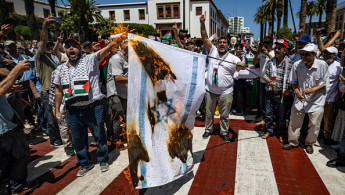Israel to reopen liaison office in Morocco with a 'Muslim envoy'
In Morocco, the Israeli liaison office is set to reopen this summer for the first time since the start of Israel's war on Gaza. Local pro-Palestine activists warn that Rabat's decision could destabilise the country.
Last week, local media reported the appointment of Hassan Kaiba, a high-profile figure in the Israeli Defence Forces (IDF), as Tel Aviv's new representative in the North African kingdom.
"It is shameful that the Moroccan state decided to replace the sexual abuser David Govrin [former Israeli envoy to Rabat] with a new war criminal, despite the Moroccan people's opposition to normalisation," commented Mouad El-Jahri, a member of the Moroccan Front Against Normalisation.
In 2022, Govrin, who led the Israeli liaison office in Rabat, faced allegations of exploiting Moroccan women working at the office and mishandling gifts from the palace.
Found guilty in an Israeli investigation, Govrin faced "disciplinary measures" but resumed his duties a year later. Rabat has never officially addressed the allegations against him.
On 18 October 2023, Govrin and the rest of the Israeli delegation left Morocco for safety after thousands of protesters vowed to barricade their office in Rabat.
Today, a diplomatic source suggested to The New Arab that the Israeli office in Rabat might reopen this summer with a new delegation, which is set to potentially revitalise the relationship and cooperation between the two countries.
Rabat has yet to officially confirm the news.
Who is the new Israeli envoy to Morocco?
After 25 years in the Israeli military, Hassan Kaiba joined the Israeli Foreign Ministry in 2002 as an advisor on Middle Eastern affairs.
Five years later, he was appointed as Tel Aviv's consul in Alexandria. This role was part of Israel's early efforts to deploy Muslim officials in the Arab world to "improve" relations with Arab populations.
Kaiba's most recent role was as the Arabic spokesperson for the Israeli Foreign Ministry. He made headlines in Morocco well before his rumoured appointment in Rabat. Last October, he referred to participants in "pro-Hamas" protests in Morocco as "not humans."
Since 7 October, Israel has been using a "dehumanisation" strategy to justify its attacks on civilian areas in Gaza, according to Neve Gordon, an Israeli professor of international law and human rights at Queen Mary University in London.
"Aside from normalisation, are there diplomatic rules for hosting a foreign official who describes Moroccans as animals?" questioned Aziz Hanaoui, a member of the Moroccan Observatory Against Normalisation, another local pro-Palestine group. "He said they are not human, which implies they are animals or monsters."
Rabat has not yet confirmed the appointment of Kaiba. Since the two states normalised ties late in 2020, Rabat has provided little to no communication on the details of its relationship with Tel Aviv.
Since the start of Israel's war on Gaza last October, Rabat has repeatedly condemned Israel’s "flagrant violations of international law" in its war against Hamas.
However, a source from the Moroccan Foreign Ministry confirmed in March to Reuters that Rabat is continuing its normalisation with Israel, arguing its benefits in advocating for the Palestinian cause.
Morocco and Israel normalised ties in December 2020 under US auspices. Over the past three years, Rabat has struggled to legitimise the deal among Moroccans, who see loyalty to the Palestinian cause as a moral imperative.
Since the onset of Israel's war on Gaza, opposition to normalisation has grown stronger in Morocco, with unprecedented weekly rallies in solidarity with Palestine.
Local pro-Palestine groups vow "a no going back" to normalisation and warn against Rabat's "disregard" for the people's will.
"[Rabat] is playing with fire [...] gambling with the security and stability of the state, and they should be held accountable," warned Ahmed Wiahmane, a member of the Moroccan Front Against Normalisation.




 Follow the Middle East's top stories in English at The New Arab on Google News
Follow the Middle East's top stories in English at The New Arab on Google News
![A group of Palestinians, foreign and Israeli activists gather to participated in an olive picking event on the land in the town of Battir, which is under threat of confiscation by Israel in Bethlehem, occupied West Bank on 8 November 2024. [Getty]](/sites/default/files/styles/image_330x185/public/2182930803.jpeg?h=199d8c1f&itok=__0LgGsa)

![People gathered around the rubble of destroyed houses to search for survivors [Getty]](/sites/default/files/styles/image_330x185/public/2024-11/GettyImages-2184733820.jpg?h=199d8c1f&itok=NiM1LO2f)